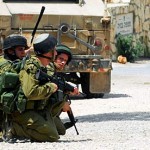Lebanese Troops Ambush IDF
 Tuesday's fatal border clash was the most serious escalation of violence between Israel and Lebanon since the end of the war four years ago.
Tuesday's fatal border clash was the most serious escalation of violence between Israel and Lebanon since the end of the war four years ago.
Earlier today, the Lebanese Armed Forces fired at IDF troops positioned along the Lebanese border in northern Israel, killing one Israeli soldier and seriously wounding another. In the exchange of fire that ensued, three Lebanese soldiers and a journalist were also reportedly killed. At this stage, initial reports do not indicate that Hizbullah was involved.
Although there have been numerous previous skirmishes between the two sides in recent years, with increased tension lately, this represents the most serious clash since the end of the war between Israel and Lebanon four years ago.
At the time of the incident, the IDF were carrying out routine maintenance, including trimming some hedges along the border. The IDF reportedly pre-coordinated the maintenance with UNIFIL, the United Nations Interim Force in Lebanon, which is charged with maintaining peace and security along the Israel-Lebanon border.
The incident occurred east of the internationally recognized "Blue Line" (the border between Israel and Lebanon) and west of the security fence, which according to International law, lies within Israeli territory. UN peacekeepers in southern Lebanon have confirmed there was no evidence that Israeli soldiers crossed the border.
Israeli Prime Minister Netanyahu and Defense Minister Barak have both said they hold the Lebanese government directly responsible for the provocation, which they called a “deliberate ambush”. Meanwhile, Israel has submitted an official complaint to the UN Secretary General and Security Council over the violent attack, citing a violation of UN Resolution 1701.
The Lebanese attack is a needless aggravation of an otherwise already tense situation along the border with Israel. Only yesterday, the International Crisis Group released a major report in which it said the Israeli-Lebanese border is “uniquely dangerous” with a “fear that a new round of hostilities would be far more violent and could spill over regionally.”
One lesson that is certain about this incident is that it demonstrates the ineffectiveness of UNIFIL in maintaining peace and security along the Israel-Lebanon border. However the question must also be asked - was this a blatant attempt by Lebanon to divert attention away from the UN investigation into the 2005 assassination of Lebanese Prime Minister Rafiq Hariri, which is widely expected to shortly blame Hizbullah and Syria for his assassination?